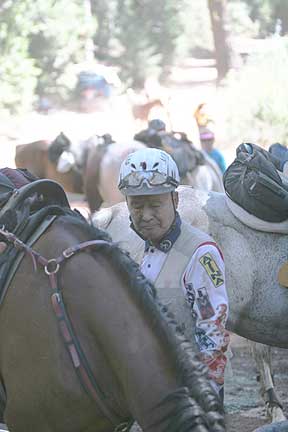What was once a thriving Sierra Nevada mining town is marked now by the tumbled remains of a well house and a few rotten beams from the old hotel. Even the foundations of the buildings are not as they were. Relic seekers of this and other generations have burrowed under them in their search for souvenirs. Nonetheless, here along the Western States Trail, at the tip of a narrow mountain spur that rises high above the chasms of El Dorado Canyon and the North Fork of the Middle Fork of the American River, is the site of the once glorious town of Deadwood.

The town acquired its name in the same haphazard manner as other mining towns of the era. Gold in paying quantity was first found in Deadwood in 1852 by a group of prospectors who up to that time had not been too successful. They happily remarked to other newcomers that they now assuredly had the 'deadwood' toward securing a fortune -- in other words, it was a cinch.
The first discoverers of gold in this locality were so positive of its richness and magnitude, their most flattering accounts of the gold strike spread, and a great influx of people resulted. The heartening news that was circulated about the Deadwood discovery caused a bustling camp to spring up, composed of over 500 miners who had toiled over fearful canyon trails to reach this remote spot. It was a wild, austere habitat, to which only the most venturesome came.
Varying estimates are made of the population, but it is known that 800 votes were cast there in the election of 1860, which would indicate an approximate population of 1500 at its peak. Many of the buildings erected were substantial, considering the isolated location of the town. Some hydraulic mining was done, but the principal mines were worked through tunnels by drifting and washing the gravel. As of 1881 there were five claims working that were original discovery locations. Most of the mines were located right in town.
When Anne Ferguson McCauley was still alive she told of her parents, Jessie and Duncan Ferguson, who ran the Half-Way House Hotel in Deadwood. "It was half-way between Michigan Bluff and Last Chance for the miners to rest, eat and drink," she related. "There was a large outdoor platform where they drove the mules to for unloading their packs. On July 4th the platform was used for dancing as everybody came from miles around, mostly by mule or horseback, as there were only narrow trails at that time. They usually celebrated a whole week."
In later years the hotel continued in operation as a boarding house, and because of its location, escaped destruction in the forest fire of 1924. However, its complete demise came several years later when the timbers of its remaining structures were salvaged by a prospector for use in building his cabin in the canyon below.
Jessie Ferguson was a colorful character at the center of the miners' lives in Deadwood for many years. As Anne McCauley recounts, "When the school was closed Jessie taught her own children as well as others. School was kept until the pupils gave out; when they got down to one they just closed the school. She was also the only doctor that many of them knew. She had a large old fashioned doctor's book, and with the help of it she managed to take care of the community. She delivered nearly all the babies. People would come to her any time, day or night, for aid. Many times in winter she would put on her big rubber boots, a heavy raincoat and, with her trusty doctor's book, go out in the middle of night in storms to aid the sick. She never received any pay except gratitude for all her kindness. She also preached the funeral services if anybody died."
As with most of the early gold mining towns, however, Deadwood gradually died. The town's transient glory in great measure departed by 1855, although mining with moderate returns continued until the last family moved out in 1906. In 1924 a forest fire wiped out the ghostly buildings that remained, save only the old hotel. Even the cemetery at the end of the point was eventually bulldozed under, its silent story lost: Its tombstones were faintly discernible with names like Maxan, Cusick, Jones, Newman, Peters, Cook, Grant, Frier, Harkness, Snyder, Green, Taylor, Williams and Ebbert.
Gone, too, are the Sundays of the solitary prospectors, usually spent in baking bread for the week, grinding a supply of coffee, washing and patching clothes, hunting or fishing. For most miners, Sunday meant a trip to town to buy provisions for the week, get their letters from home, visit with friends, drink, gamble, and enjoy the excitement of the scene. The day no longer exists where, as for the miners of Deadwood, dressing up once meant "washing the face and hands, taking a fresh cud of fine cut (Mrs. Miller's Brand), or donning a clay pipe well stocked." Only an old well remains at the town site, if you know where to look.
Next: Michigan Bluff






